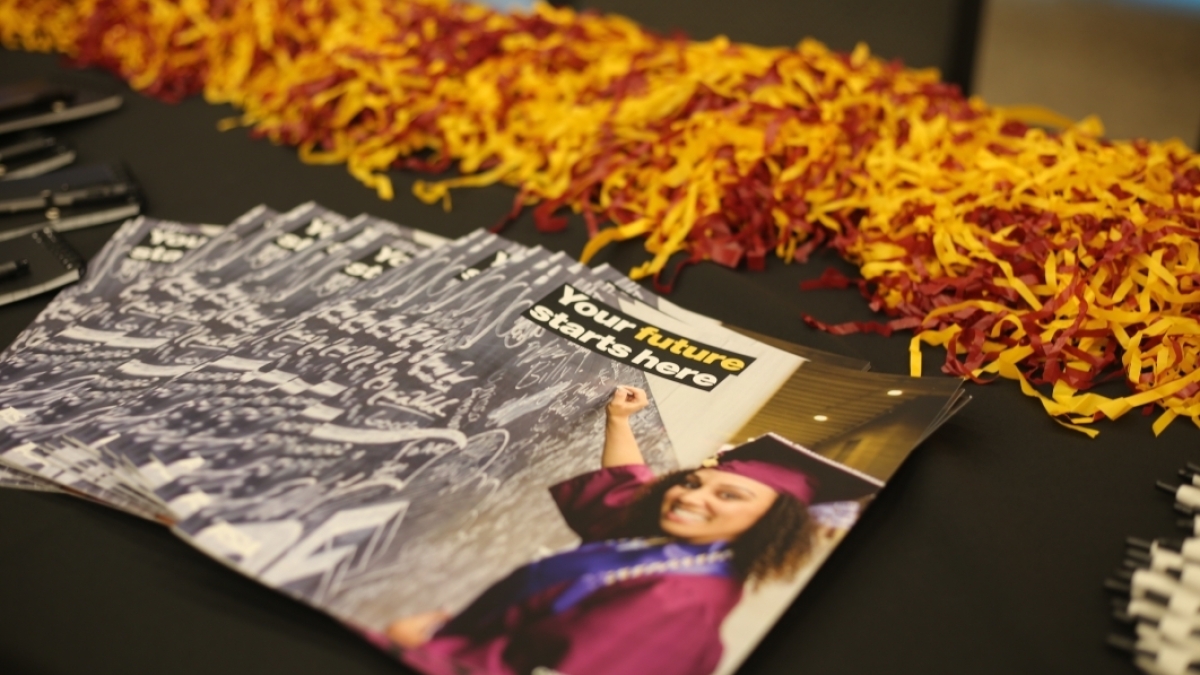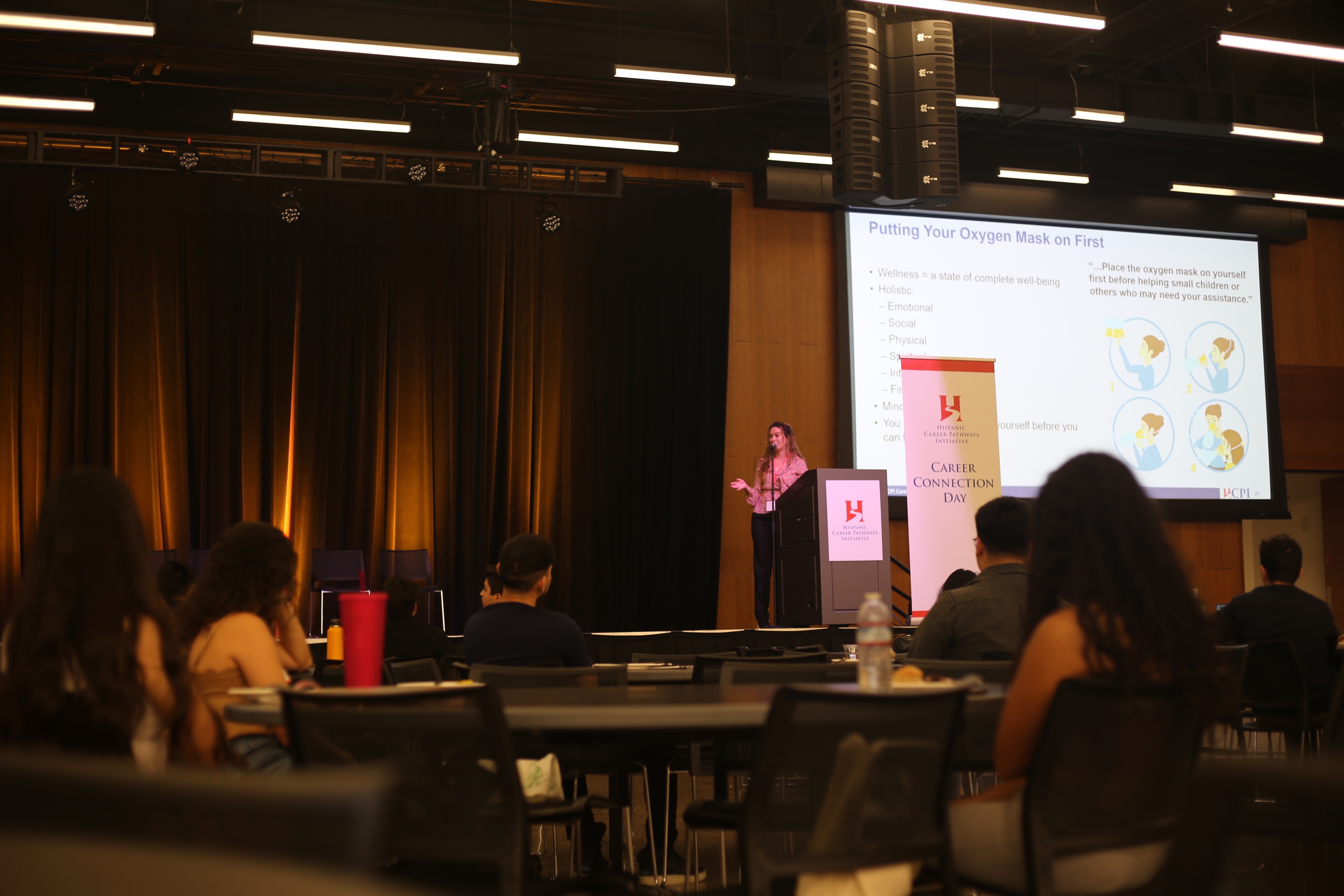ASU's soaring Hispanic graduation rates fuel career empowerment event

Arizona State University has a longstanding commitment to supporting increased college enrollment and graduation rates of Hispanic students. In an effort to promote career growth and development among college students in the Hispanic/Latino community, ASU partnered with the Hispanic Scholarship Fund (HSF) to present a Career Connection Day.
More than 100 ASU students eager to begin their professional journeys participated in the event that took place Saturday, Sept. 30, in the Student Pavilion at ASU's Tempe campus.
“The Career Connection Day is a key component of the Hispanic Career Pathways Initiative, a collaborative effort that aims to empower Hispanic and Latinxgender-neutral alternative to Latino/a students with the skills, knowledge and resources needed to navigate their paths to career success,” said Safali Patel, associate vice president and executive director of ASU Career Services.
The half-day event provided the opportunity for students to tap into the insights and experiences of Career Services representatives and accomplished ASU alumni who have succeeded in their respective careers. The participants engaged in an array of essential career-building skills designed to support and inspire them, such as resume development, interview techniques and navigating the job market. Program highlights included guest speakers from both HSF and ASU, in-depth sessions on career best practices, valuable tools and resources, a panel discussion on career support, exciting prize giveaways and complimentary breakfast and lunch for all attendees.
“I am an online student and Hispanic, so attending an event like this helps me to get more involved in person and provides more exposure to opportunities,” said Daniel Castillo, an ASU junior studying health and biological sciences.
With a focus on inclusive excellence and alignment with the ASU Charter, the program reached a historically underrepresented Hispanic and Latino community of students while helping to ensure equitable career outcomes for all ASU students.
One in four ASU students identifies as Hispanic/Latino, totaling more than 31,000 students. Those growing numbers follow a year in which ASU was recognized as a Hispanic-Serving Institution, earned a second Seal of Excelencia by Excelencia in Education and joined the Presidents for Latino Student Success.
Over the past two decades, from 2003 to 2013, ASU graduated 18,424 Hispanic/Latino students. This number increased by 175% to 50,609 in the following decade (2013 to 2023).
Andrea Garcia, director of strategic partnerships for the Hispanic Scholarship Fund, presents at Career Connection Day. Photo by Devon Baggot/ASU Student Life
“Reflecting on the historic growth in enrollment and graduation rates of Hispanic students at ASU brings me tremendous pride,” said Executive Vice President and University Provost Nancy Gonzales. “This growth also underscores the vital importance of preparing our students for careers not just academically but in how to demonstrate their expertise when meeting future employers. We are grateful for our ongoing partnership with HSF and their support for Career Connection Day. I strongly encourage all students to take advantage of events like these that are designed to support your transition to meaningful career experiences after graduation.”
For nearly half a century, the Hispanic Scholarship Fund has been a vital source of college-readiness information and resources for Hispanic families, having awarded more than $675 million in scholarships and enabling countless students to pursue and earn college degrees.
“HSF provides a continuum of career support programs and services designed to give Hispanic college students the knowledge, network and skills needed to find meaningful employment in their field of interest and achieve career success in a knowledge-driven global economy,” said Andrea Garcia, director of strategic partnerships at HSF.
Since 2015, ASU has partnered with the Hispanic Scholarship Fund, hosting numerous HSF initiatives, including College Camp — a free, bilingual event to help sixth through 12th grade students and their families learn more about the college admissions and financial aid processes. In April of this year, ASU was honored with the organization’s prestigious Education Partner of the Year award.
“The opportunity to present the Career Connections Day in collaboration with the Hispanic Scholarship Fund builds on an already strong relationship that directly impacts the academic and professional success of our students,” said James Rund, senior vice president of Educational Outreach and Student Services at ASU. “Our connection to the Hispanic Scholarship Fund adds great value to ASU's ability to connect our students to accessible financial, career and academic resources."
More Arts, humanities and education

Upcoming exhibition brings experimental art and more to the West Valley campus
Ask Tra Bouscaren how he got into art and his answer is simple.“Art saved my life when I was 19,” he says. “I was in a…

ASU professor, alum named Yamaha '40 Under 40' outstanding music educators
A music career conference that connects college students with such industry leaders as Timbaland. A K–12 program that…

ASU's Poitier Film School to host master classes, screening series with visionary filmmakers
Rodrigo Reyes, the acclaimed Mexican American filmmaker and Guggenheim Fellow whose 2022 documentary “Sansón and Me” won the Best…


